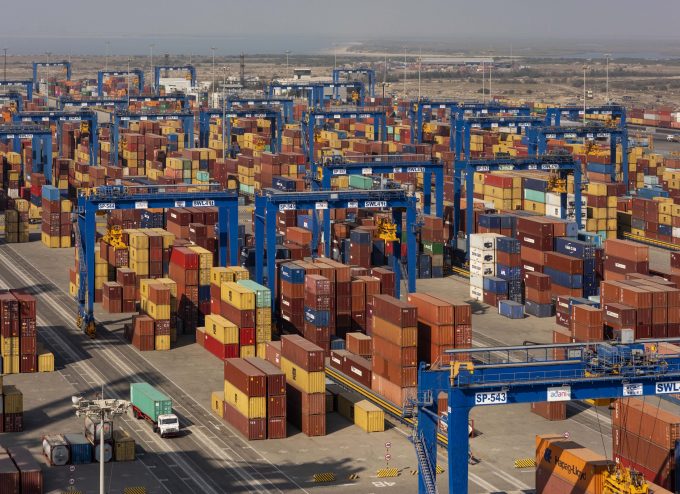Zim aims to strengthen Indian trades with deepsea VSA with MSC
Israeli carrier Zim is attempting to raise its sagging service profile on Indian trades with ...
F: MAKING MONEY IN CHINAMAERSK: THE DAY AFTERDHL: NEW DEALGXO: NEW PARTNERSHIPKNIN: MATCHING PREVIOUS LOWSEXPD: VALUE AND LEGAL RISKMAERSK: DOWN SHE GOESVW: PAY CUTFDX: INSIDER BUYXOM: THE PAIN IS FELTUPS: CLOSING DEALSGXO: LOOKING FOR VALUE
F: MAKING MONEY IN CHINAMAERSK: THE DAY AFTERDHL: NEW DEALGXO: NEW PARTNERSHIPKNIN: MATCHING PREVIOUS LOWSEXPD: VALUE AND LEGAL RISKMAERSK: DOWN SHE GOESVW: PAY CUTFDX: INSIDER BUYXOM: THE PAIN IS FELTUPS: CLOSING DEALSGXO: LOOKING FOR VALUE

Government ports in India will face significant disruption if negotiations to avert an indefinite dockworker strike from 28 August fail to reach agreement, union leaders warned.
That threat comes as India is pushing hard on port flow enhancements to meet higher export volumes accruing from diversified supply chains.
At a recent joint meeting, a federation of six labour groups representing payroll and contract workers across 12 major ports voted unanimously for industrial action.
“We have already issued appropriate notices to various port authorities and related government bodies,” T Narendra Rao, general secretary of the Water Transport Workers Federation of India, told The Loadstar.
“We tried in vain to address our long-overdue charter of demands through seven rounds of talks with port leaders and government representatives over the last three years,” explained Mr Rao.
He claimed authorities remained apathetic on worker concerns regarding wage enhancements, productivity-linked rewards and festival bonus entitlements.
“The ministry took a highly provocative stand without having any substantial justification and created a stalemate in the discussions,” said the unions in their joint strike notice.
In the absence of an approved productivity-linked reward scheme since 2021, interim retirees from the ports have lost these benefits, added union sources.
No negotiations are planned, but as a routine procedure, union representatives expect an invitation from the chief labour commissioner for conciliatory talks in the coming days, ahead of potential direct government-level intervention.
“We will strongly press our demands, which are absolutely legitimate and in the interest of workers,” a labour union source said. “We will play to our strengths at the ports.”
On top of wage-related grievances, the unions are particularly concerned at the government’s drive for privatisation which, they argue, has serious job security repercussions.
An updated port management law in late 2022 – despite strong labour pushback – sought to transform major port trusts into entities akin to a corporate body.
And, pursuing an ‘asset monetisation’ strategy, Nhava Sheva, which handles a significant portion of India’s containerised trade, is now a full-fledged landlord port, with all terminal facilities licensed to private operators.
Yet, Indian government ports continue to face heightened growth pressures because of a steady erosion of market share to smaller ports, led by Adani Group. For example, a few years ago Adani’s Mundra passed Nhava Sheva port to emerge as India’s top container handler. Mundra grew fiscal year 2023-24 volumes 12% year on year, to 7.4m teu, while Nhava Sheva handled 6.4m teu, up 6%, according to data.
Any port disruption, even if with scattered impact, could make supply chains more challenging for Indian shippers already hit hard by the Red Sea crisis, which has sent vessel schedules off-kilter and ocean freight rates unusually high on some routes.
That said, the overall strength of labour unions at Indian ports has eroded considerably over the years, due to the impact of the country’s so-called “gig economy”.
Comment on this article